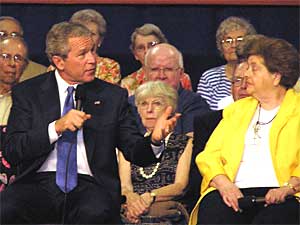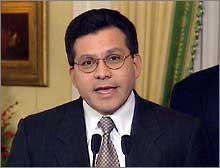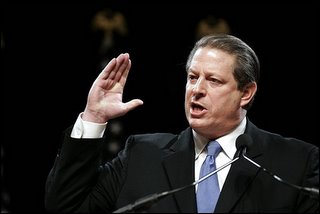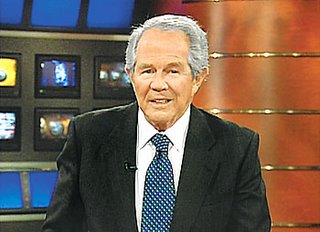Kerry to Lead Filibuster of Alito!
When America is faced with a President who flaunts his illegal wiretapping of Americans bypassing FISA courts, the Senate is faced with a nominee from this same President who believes in an expansive power of the Presidency.
John Kerry understands what is at stake. He has fought for America in Vietnam and he is now fighting for America on the floor of the Senate!
From Raw Story, here is an excerpt of Senator Kerry's statement on the floor of the Senate yesterday:
“Throughout his legal career -- these are not things that are made up. These are defined by the writings, by the decisions, by the memoranda, by the speeches that Judge Alito has made. In each of those, in all of those, there is a startling lack of skepticism that is healthy in judges towards government power that infringes on individual rights and liberties. Professor Goodwin Liu of the University of Berkeley Law School concluded after analyzing those:Thank you Senator Kerry! America needs your leadership now and in the future. America would not be involved in unnecessary wars, would not be tapping the phones of Americans, reviewing the reading habits of Americans, inspecting the Google searches of Americans or failing to provide aid to victims of natural disasters if you were President today!
“Judge Alito ‘is less concerned about the government overreaching than Federal appeals judges nationwide, less concerned than Republican-appointed appeals judges nationwide, and less concerned than his Republican-appointed colleagues on the Third Circuit.’
“Aren’t we going to be concerned that he is less concerned than those of the same stripe? Not only is his record outside the mainstream of the judicial spectrum, but ‘it is at odds with the Supreme Court's vital role in protecting privacy, freedom, and due process of law.’ That is Professor Liu.
“In 1984, for example, Judge Alito wrote a Justice Department memorandum concluding that the use of deadly force against a fleeing unarmed suspect did not violate the fourth amendment. The victim was a 15-year-old African American. He was 5 foot 4. He weighed 100 to 110 pounds. This unarmed eighth grader was attempting to jump a fence with a stolen purse containing $10 when he was shot in the back of the head in order to prevent escape. The Sixth Circuit Court of Appeals found the shooting unconstitutional because deadly force can only be used when there is ‘probable cause that the suspect poses a threat to the safety of the officers or a danger to the community if left at large.’ That is what we teach law enforcement officials.
“But Judge Alito disagreed. Judge Alito said: No, he believed the shooting was reasonable because ‘the State is justified in using whatever force is necessary to enforce its laws’--even deadly force. That is his conclusion. That is the standard that is going to go to the Supreme Court if ratified. It is OK to shoot a 15-year-old, 110 pounds, a 5-foot-4-inch kid who is trying to get over a fence with a purse, shoot him in the back of the head.
“Otherwise, Judge Alito believed that any suspect could evade arrest by making the State choose between killing them or letting them escape. That is the conclusion. Think about that. Judge Alito believed that the State could use whatever force was necessary to enforce its laws regardless of whether the suspect was armed or dangerous. Does the Chair believe that? Do the other Senators believe that? I don't think so. Do mainstream Americans believe that?
“Lucky for us, we did not have to answer that question. Why? Because in 1985, Justice White rejected Judge Alito's position, and the court held that deadly force is not justified ‘where the suspect poses no immediate threat to the officer and no threat to others.’ The court stated unequivocally, ‘a police officer may not seize an unarmed, nondangerous suspect by shooting him dead.’
“So Judge Alito is out of touch with mainstream jurisprudence with respect to the use of force in America. Becoming a Federal judge did not make Judge Alito any more protective of an American's personal privacy and freedoms when it comes to government intrusion. That ought to concern every conservative in this Nation. Every conservative in America ought to care about the government's power to just walk into your home, to intrude on the rights of individual Americans.
“In Baker v. Monroe Township, over a dozen local and Federal narcotics agents raided the apartment of Clement Griffin, just as his mother and her three children were arriving for a family dinner. Officers forced the family down to the ground, pointed guns at them, handcuffed and searched them. Two Reagan appointees to the court held that a jury should decide whether excessive force was used, but Judge Alito disagreed. He agreed that the search was ‘terrifying’ and ‘most unfortunate.’ But he did not believe that the family had a right to make their case to a jury in court. He would have denied those American citizens, terrified as they were, their day in court.
“Judge Alito, I regret to say, often goes out of his way to justify excessive government actions. Many have talked in the Senate about Doe v. Groody, where Judge Alito, dissenting in an opinion by our current head of the Department of Homeland Security, then-Judge Michael Chertoff, concluded that the strip-search of a 10-year-old girl was unreasonable. That was the conclusion of Judge Chertoff. Judge Alito concluded that the strip-search of a 10-year-old girl was reasonable.
“He reached this astonishing conclusion on a technicality. Rather than relying on the search warrant to determine whether the strip search of a child was authorized, Judge Alito argued that the court ought to look to the police officer's supporting affidavits.
“As a rule, however -- now, I can say this as a former prosecutor because we used to labor over those warrants very carefully, knowing they were going to be scrutinized -- affidavits are not part of the search warrants unless the trial judge decides they are. That ‘goes to the heart of the constitutional requirement that judges, not the police, authorize the warrants.’ But Judge Alito said: No, no, no, no, it is OK to go look behind what they were intending, and decided they must have intended to include the search of the entire family, including a 10-year-old child. Is that the standard we want on the Court?
“Judge Alito's minimalist view of the fourth amendment's right to privacy is not limited to claims of excessive force. In United States v. Lee, he upheld the FBI's installation of a video and audio surveillance device in a hotel room in order to record conversations between the target of a bribery sting and a police informant. The FBI conducted the surveillance without a warrant, arguing, first, that the target had no expectation of privacy in a hotel room, and, second, that the device was turned on only when the informant was in the room. Judge Alito accepted the FBI's argument, and found no constitutional violation.
“His eagerness to buy the FBI's arguments, particularly in light of the Supreme Court decisions to the contrary, raises serious questions about how he would approach serious constitutional violations to the National Security Agency's program of domestic eavesdropping. Americans across the board are concerned about the violation of the law with respect to what we passed in the Congress overwhelmingly. After all, with the eavesdropping in Lee and the eavesdropping being conducted now, we see some startling similarity. Both are defended on the basis of Executive discretion and self-restraint.
“The fourth amendment is not defined that way. It is defined by judicial restraint itself, not the Executive restraint, and by judicial review.
“We also should never forget, as we think about this issue, the words of an eminent Justice, Justice Brandeis, who said:
Experience should teach us to be most on our guard to protect liberty when the Government's purposes are beneficent....The greatest dangers to liberty lurk in insidious encroachment by men of zeal, well-meaning but without understanding.
“I believe that is what we need to protect ourselves against. That is what the Framers created the judiciary to do. And that is what I fear the record shows Judge Alito has not been willing to do.
“Now, if his judicial opinions and legal memoranda do not convince you of these things, you can take a look at the speech he gave to the Federalist Society in which, as a sitting judge, he ‘preached the gospel’ of the Reagan Justice Department nearly 15 years after he left it; a speech in which he announced his support of the ‘unitary executive theory’ on the grounds that it ‘best captures the meaning of the Constitution's text and structure.’
“As Beth Nolan, former White House counsel to President Clinton, describes it:
‘Unitary Executive’ is a small phrase with almost limitless import: At the very least, it embodies the concept of Presidential control over all Executive functions, including those that have traditionally been exercised by ‘independent’ agencies and other actors not subject to the President's direct control. Under this meaning, Congress may not, by statute, insulate the Federal Reserve or the Federal Election Commission...from Presidential control.
“Judge Alito believes you can. The phrase is also used to embrace expansive interpretations of the President's substantive powers, and strong limits on the Legislative and Judicial branches. This is the apparent meaning of the phrase in many of this Administration's signing statements.
“Now, most recently, one of those signing statements was used to preserve the President's right to just outright ignore the ban on torture that was passed overwhelmingly by the Congress. We had a long fight on this floor. I believe the vote was somewhere in the 90s, if I recall correctly. Ninety-something said this is the intent of Congress: to ban torture. But the President immediately turned around and did a signing in which he suggested an alternative interpretation. And Judge Alito has indicated his support for that Executive power.
“During the hearings, Judge Alito attempted to convince the committee that the unitary executive theory is not about the scope of Presidential power. But that is just flat wrong. Not only does the theory read Executive power very broadly, but, by necessity, it reads congressional power very narrowly. In other words, as the President gains exclusive power over a matter, the Constitution withholds Congress's authority to regulate in that field. That is not, by any originalist interpretation, what the Founding Fathers intended."
Thank you Senator Kerry! America needs a President who respects the rights of privacy of all Americans. A President who not only enforces the laws but obeys the laws himself. We need a Supreme Court that protects the little guy against big government and big corporate abuses.
We need John Kerry in 2008! We've got your back John!
Bob




























